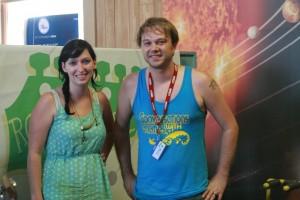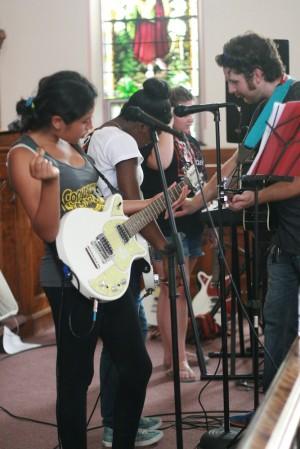How Rock to the Future is filling in the gaps in Philadelphia music education (see them at #xpnfest this weekend)

“Our goal is to spark an interest in music for the kids,” Rock To The Future co-founder Jessica Craft says as I sit with her in a sectioned-off corner of a wood-floor church auditorium. “A lot of them have probably never even seen an instrument up close before; they probably have never had an opportunity to touch a guitar or a piano.”
With a small coffee table between us, two mis-matched couches, and a small stage on the other side of a makeshift wall, Jessica and her partner Josh Craft bask in the heavy breeze of the window air conditioner that blows down on the “lounge” as the other teachers help the summer camp participants downstairs with lunch. Holding their first-ever summer session, the couple chats about their plans for the XPonential Festival this weekend and ideas for future programs.

Jessica and Josh Craft | Photo by Elizabeth Mazenko
The Crafts started Rock To The Future (RTTF) in 2010 with a mission to provide free music education to the under-served students of Philadelphia and their families. Their goals are high, but important: a 100% high school graduation rate and post-secondary program attendance rate. Most important, RTTF is based on the idea that learning music can have an overall positive effect on students’ lives, both in school and out.
“[Music education] has been proven to improve academic performance, test-taking skills, cognitive thinking, memorization, and focus,” Jess says, citing some of the research by educational nonprofit The Dana Foundation that’s shaped the program’s philosophy.
With that in mind, Jess and Josh are going farther than just giving students a place to jam after school. They track their participants’ report cards, PSSA scores, and attendance to obtain feedback on the effects of their various programs. “We are trying to compile our own data to add to the research that has already been done.”
Starting off with about 13 students their first year, RTTF has added on a few more programs to their after-school service, including free Saturday sessions, a new summer camp, and in September, a mobile music workshop. Through these programs, they give about 500 students throughout the year an opportunity to participate in learning music theory, choosing and learning an instrument of their choice – guitar, bass or drums. In some cases, this means creating a band, writing original music, attending vocal workshops, and performing at World Live Café. After building the program for three years, Jess and Josh have been able to leave their day jobs (and place their band, Conversations With Enemies, a bit on the back-burner) to solely focus on Rock to the Future and their drive to make a difference in the city.

Students working with teachers at Rock To The Future’s summer camp last week | Photo by Elizabeth Mazenko
This weekend, RTTF will be featured in the Kids’ Corner Children’s Garden at the XPonential Music Festival.
“We are looking at XPonential as an opportunity to make potential supporters aware of the necessity of music education, and the lack of it in Philadelphia schools; and that Rock To The Future is providing it for under-served kids,” Jess says.
It’s also an opportunity to interact. From noon until 5 p.m. each day the group will offer workshops and activities for kids ages 3 to 13: making hand drums out of everyday household items, crash courses in guitar, bass, or piano in fifteen minutes, and an “instrument zoo” which invites kids to come, touch, and learn about various contemporary instruments. After, they will invite participants to jam with Kathy O’Connell from Kids’ Corner.
Mulling the possible impact RTTF can have on Philadelphia’s students, Jess says “Luckily with this location, we are right on the edge of Fishtown and Kensington. I was looking at a map yesterday, and fortunately / unfortunately, we are in the highest high school dropout area in Philadelphia.”
So in that sense, Rock to the Future has a three-year plan to expand and offer more to the community, but within self-imposed limits.
“We don’t want to grow to the point where kids are falling through the cracks,” Josh says. “You know, they come here so that we can catch them.”